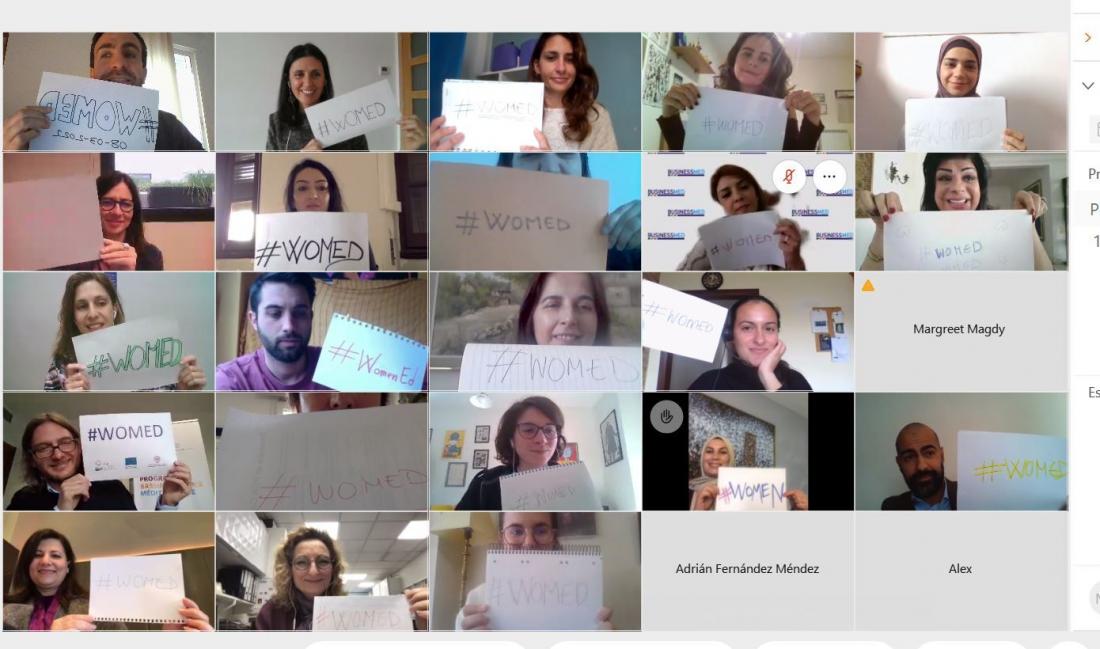Women need more than flowers, they need equal treatment, access to credit, and society’s support to break stereotypes: read the main findings of our webinar on women entrepreneurs

On the International Women's Day 2021, the ENI CBC Med Programme organised a webinar on “Women entrepreneurs: an essential factor to achieve real gender equality in the Mediterranean”. During more than two hours, speakers from all over the region debated on what are the challenges and how can a Mediterranean woman be a successful entrepreneur. The outcome is inspiring.
Laws on equality are essential to set a legal framework but it must be accompanied by educational programmes on gender equality to make it effective
Ms Daría Terrádez Salom, general director of EU relations at the Generalitat Valenciana in Spain, opened this webinar with examples of gender gap despite having law that should ensure equality (i.e. art 14 of the Spanish Constitution). For instance, in this country, the pay gap is still 21%. She also considers that women continue to be treated as objects: they are still defined by their physical appearance, and not by their intellectual abilities. In this sense, she affirmed that gender equality has to be guaranteed in all sectors but most importantly laws must go along with education on democratic values and gender equality.

Women continue to be treated as objects: they are still defined by their physical appearance, and not by their intellectual abilities.
Women should be more involved in the social dialogue with governments to ensure more equality
Jihen Boutiba, General Secretary of the Union of Mediterranean Confederations of Enterprises, gave some examples of projects she manages (coordinator of INVESTMED, partner in SOLiD) that help women access to business and decision-making positions. She highlighted that women economic empowerment is not only a human right but also a powerful tool for governments to put their economies back on track. Regarding gender mainstreaming, she believes that women should participate more actively in the social dialogue between the civil society and the government as this is the forum where most laws are discussed.
Women economic empowerment is not only a human right but also a powerful tool for governments to put their economies back on track.

Being a woman entrepreneur in the Middle East is 10 times harder than in Europe
Penelope Shihab, one of the most influential Arab women in 2018, defines herself as a scientist and entrepreneur in Jordan. “To be a woman entrepreneur in an Arab country, you have to be very strong, fearless, so independent, free, so skilled, educated and liberal in order to face a male dominated society, which discriminate women through laws.”
She gave a glimpse of some of the most important challenges she had to face as a woman entrepreneur: access to finance (how to convince investors that she can make it despite of being an Arab, Muslim woman), access to data, access to safe and secure transport (so no need to travel with a husband or a brother to undertake the work), fight against stereotypes in the region (women should get married, raise their children and take care of their home instead of being entrepreneurs).
She advocates for more “women role model” that can inspire new generations and does not forget the importance of her family support in order to achieve her dreams.

To be a woman entrepreneur in an Arab country, you have to be very strong, fearless, so independent, free, so skilled, educated and liberal in order to face a male dominated society, which discriminates women through laws.
When it comes to buying, women represent 70% of the decision-making. When women have access to finance and wealth, they tend to redistribute more
Rana Ezzeddine, vice-president of the International Federation of Business and Professional Women (BPW), had the chance to have an aunt as a role model and an open-minded grandfather who believed in women empowerment and its benefits for the family and the society as whole. The Lebanese businesswoman confirmed that without diversity in business, meaning having more women in business, we cannot have a strong economy.
We need scaling up (changing the laws) but also scaling deep (changing mindsets) to empower a woman
Iman Bibars, vice-president of Ashoka, an international organisation for social entrepreneurship, likes to present herself as a social entrepreneur and woman activist.
In the case of Egypt, she explained that laws have improved a lot the last few years in terms of social and political rights for women but the village is missing meaning the people and the community is not following the path of the legal framework. Therefore, she thinks that the rules of the game should be changed through education to change the mindset of people.
It takes a village to empower women: rules of the game should be changed through education to change the mindset of people.

Answering to the question of what do women need to become independent, she responded that they need to believe in themselves, work hard and excel in what they do.
Educating in equality and more role model
To conclude, Mediterranean women need more role models. The more voices will be heard, the more it will inspire girls and young women to follow the path of these “role models” and challenge the social and cultural barriers to fulfil their careers.
While improvements have been done on the legal level, there is still a big gap between theory and practice. Economies need to better harness women’s workforce contribution for sustainable growth. All speakers agreed that educating in equality is the answer to build a new generation where women can be independent, empowered, fully part of the society and contribute to the Mediterranean economy.
It was such an eye-opening event! All the presentations were inspiring and motivational. Thanks ENI CBC Med Programme for organising this wonderful empowering event.












